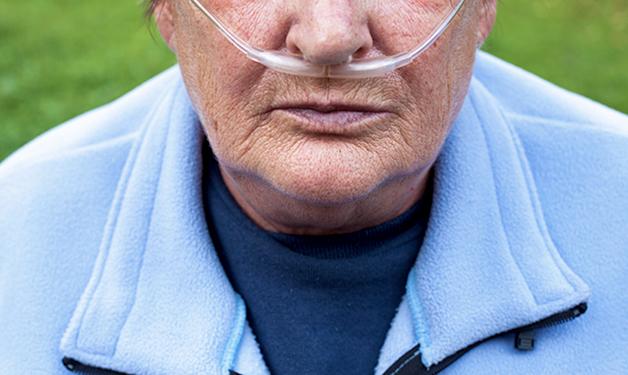
Vancouver researchers help COPD patients stay independent while dramatically reducing hospital admissions and lengths of stay.
In Canada, as well as globally, chronic pulmonary disease (COPD) is a leading cause of morbidity and mortality. The disease—which causes inflammation of the lungs and makes it more difficult to breathe—is life-changing for patients and their families. In more severe cases, trips to the emergency room and regular hospital admissions are all too frequent, putting a great deal of strain on patients, families and the health care system.

Looking at the statistics, Vancouver Coastal Health Research Institute (VCHRI) researcher Dr. Mark FitzGerald recognized an opportunity that could steer the direction of best practices in COPD patient care.
“COPD is the number one cause of hospitalization in Canada. Hospitalizations account for more than half of COPD-related costs.”
In response, some hospitals are integrating comprehensive case management programs into their care plan for COPD patients. The goal of these programs is to provide frequent contact and follow-ups with patients to support their recovery outside of the hospital and help reduce re-admissions. However, up to now there was no clear understanding in a real world setting of the effectiveness of this program.
Helping patients manage at home
FitzGerald and colleagues examined the impact of a comprehensive case management program for patients with COPD at five large hospitals in Vancouver, BC, including Vancouver General Hospital. Published in the International Journal of COPD, their research compared data on hospitalizations from a year prior to implementing the program with data from the two years following the introduction of the comprehensive disease management program.
They found that the program reduced COPD-related hospitalizations by 30 per cent by the end of the second year. COPD-related readmission rates within 90 days of each patient’s earliest hospital admission for COPD declined from 28.4 per cent to 11.4 per cent. The length of stay of COPD-related admissions also declined from 10.8 to 6.8 days.
“We found that case management practices can reduce hospital visits, dramatically improve patients’ quality of life and lower health care costs.”
FitzGerald attributes the results to the disease management program promoting greater patient awareness of COPD management. Patients received follow-ups to help them take medications properly and make healthy lifestyle choices. FitzGerald believes this supported better health outcomes, fewer trips to the hospital and shorter hospital stays.

Worsening symptoms have a great impact on patients’ quality of life. However, when patients stay on top of their treatment routines, their symptoms are more likely to stabilize, making it easier to adapt to their COPD and maintain a better quality of life.
“We see better outcomes when COPD patients are educated on how to use their medication and given strategies to prevent worsening of their COPD.”
Shorter hospital stays have additional benefits, including decreased exposure to pathogens and greater independence. They also reduce hospital-based costs associated with COPD, which range from $646- to 736-million per year in Canada, excluding the cost of routine care.
Vancouver General Hospital continues to offer a comprehensive case management program for COPD patients. Thanks to the results of FitzGerald and colleagues, they have peer-reviewed research to back this decision.


